Cold Weather Safety Tips for Seniors

As the mercury drops and winter’s chill takes hold, seniors across the U.S. face challenges that go far beyond the inconvenience of a cold morning. Cold weather can significantly impact the health and safety of older adults, making them vulnerable to hypothermia, frostbite, and a myriad of complications that can arise from existing health conditions. For those with mobility limitations, the risks are amplified; slippery conditions and isolation due to difficulty in navigating the wintry outdoors can become daunting.
The urgency of cold weather safety for seniors cannot be overstated—a single fall on the ice could mean the difference between independence and assisted living. Through this discourse, we aim to shed light on these seasonal hazards while asserting the crucial role of informed, proactive measures.
Winter safety is not just about comfort; it’s about ensuring a continuity of care and dignity for our beloved elders. At Shower Bay, we stand at the forefront of this mission, providing pragmatic solutions that safeguard the well-being of our seniors in the comfort of their own homes. We created this guide to arm seniors and their caregivers with the knowledge and strategies to stay safe, warm, and well during the chilliest months of the year.
Understanding the Risks
The human body’s ability to regulate temperature weakens with age. This makes older adults particularly susceptible to the effects of cold weather, which can lead to serious conditions if not managed carefully.
For seniors contending with mobility limitations, the risks associated with cold weather are not just uncomfortable—they can be downright dangerous. Without the ability to easily move or exercise to generate warmth, seniors are at a greater risk.
Recognizing Hypothermia and Frostbite
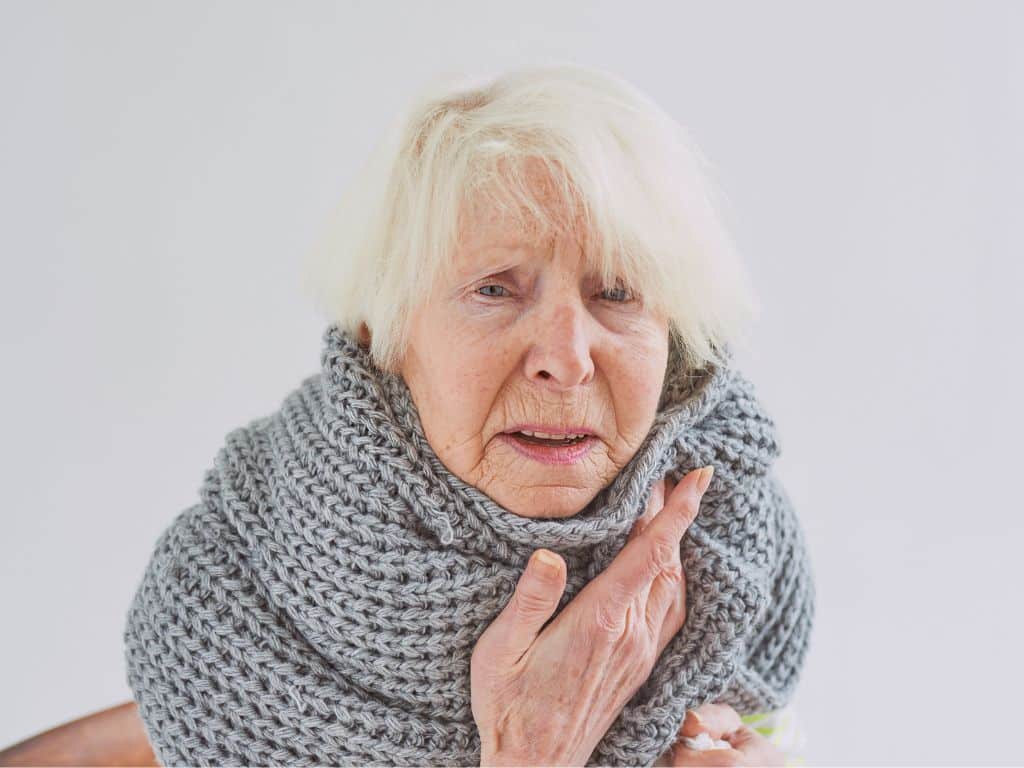
Cold weather can bring about two critical medical conditions: hypothermia and frostbite. Knowing the signs and taking swift action can be life-saving.
Signs and Symptoms of Hypothermia
- Unusual Coldness: Feeling extremely cold, particularly in comparison to others in the same environment.
- Shivering: One of the first signs; although, it’s important to note that in severe hypothermia, shivering might stop.
- Slow, Slurred Speech or Mumbling: Difficulty in speaking or slurred words can be a sign of a body’s core temperature dropping.
- Lack of Coordination: Stumbling or appearing uncoordinated could indicate muscle stiffness due to cold.
- Fatigue or Drowsiness: Overwhelming tiredness or falling asleep could signal the body’s inability to regulate its temperature.
- Confusion or Memory Loss: Difficulty in thinking clearly, confusion, or inability to remember simple information may occur.
- Weak Pulse: A pulse that is weak or slower than normal is a serious sign of hypothermia.
- Shallow Breathing: Breathing that is slow and shallow can mean the body is trying to conserve heat and energy.
Signs and Symptoms of Frostbite
- Numbness: A lack of feeling in affected extremities, such as fingers, toes, noses, or earlobes.
- Discoloration: Skin may appear white, bluish-white, or grayish-yellow as blood flow is restricted.
- Hard or Waxy Skin: Affected areas may feel unusually firm or waxy when touched.
- Clumsiness: Because of joint and muscle stiffness, coordination is often impaired.
- Blistering: In severe cases, blisters may develop after warming up the frostbitten areas.
- Pain: There can be aching, throbbing, or even a burning sensation as the area is rewarmed or thaws.
What to Do If Hypothermia or Frostbite Is Suspected
If you suspect hypothermia or frostbite, it is crucial to get the person to a warmer place and seek medical assistance immediately. In the meantime, remove any wet clothing, warm the center of the body first, and avoid rubbing or walking on frostbitten feet or toes, if frostbite is the concern.
Dressing Appropriately
Proper attire is your first line of defense against the cold. Ensuring seniors are warmly dressed when going outside is essential for preventing cold-related illnesses.
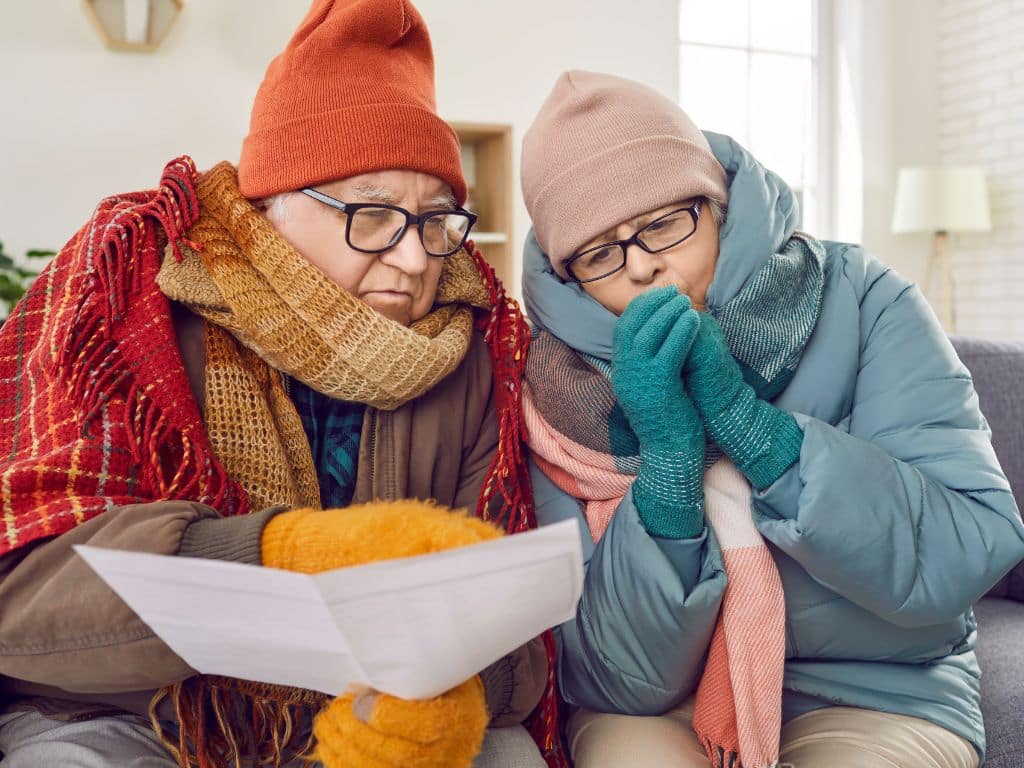
Layering is a key strategy for maintaining body heat. Wearing multiple layers traps warm air close to the body and provides better protection than a single thick layer. Opt for moisture-wicking materials as the base layer, followed by insulating layers, and a waterproof and windproof outer layer.
In addition to layers, accessories like hats, gloves, and scarves are vital for keeping extremities and the head warm. Remember that a significant amount of body heat is lost through the head, so a well-insulated hat is a must.
Footwear with good traction to prevent falls and that is insulated to protect against the cold is crucial. Look for nonskid soles and warm, waterproof boots, especially for snowy or icy conditions.
Maintaining a Warm Home
Keeping the home warm is essential for the well-being of seniors in winter. A few simple steps can ensure their safety and comfort.
Regular maintenance of heating systems, such as furnaces and chimneys, is critical to prevent failures or carbon monoxide leaks. Have a professional check and service these systems before the onset of winter.
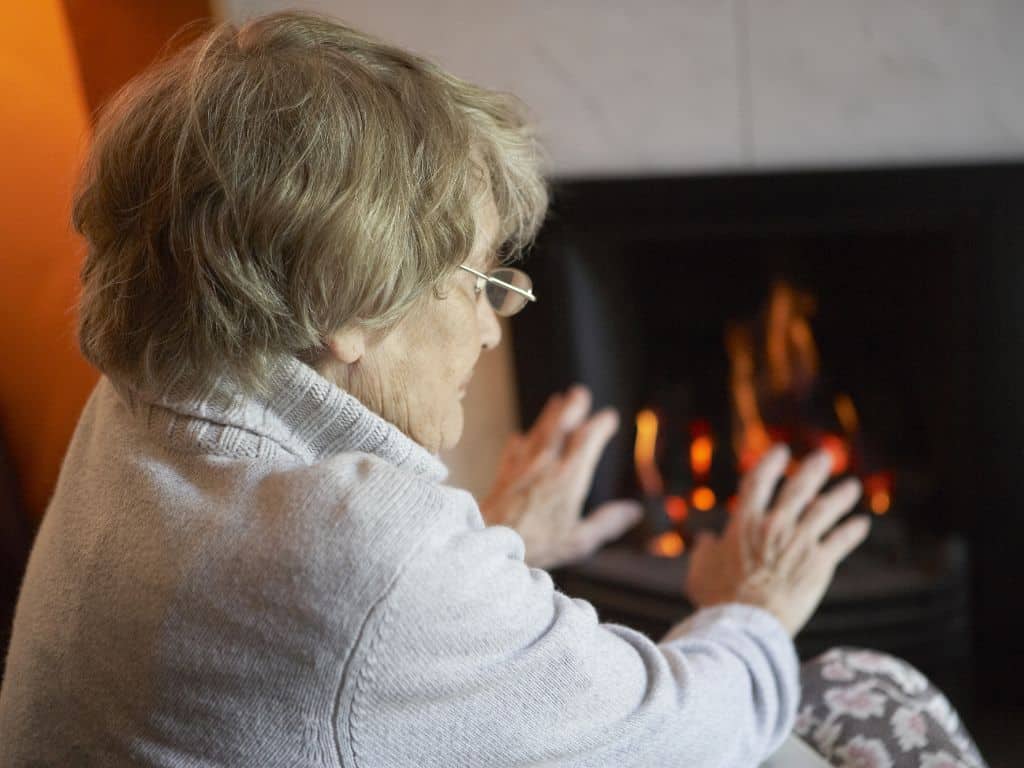
Ensuring that the home is well-insulated and that windows and doors are draft-proof can help maintain a comfortable temperature inside. Consider using weather stripping, caulking, or insulation to seal any drafts.
If using space heaters, always follow safety guidelines. Keep them at least three feet away from anything that can burn and never leave them unattended. Use models with an automatic shut-off feature if they’re accidentally tipped over.
Staying Active Indoors
Staying physically active is vital for maintaining body heat and overall health in the winter. For seniors, this often means engaging in safe indoor exercises.
There are many options for indoor exercise, from simple stretches to using exercise equipment like stationary bikes or treadmills.
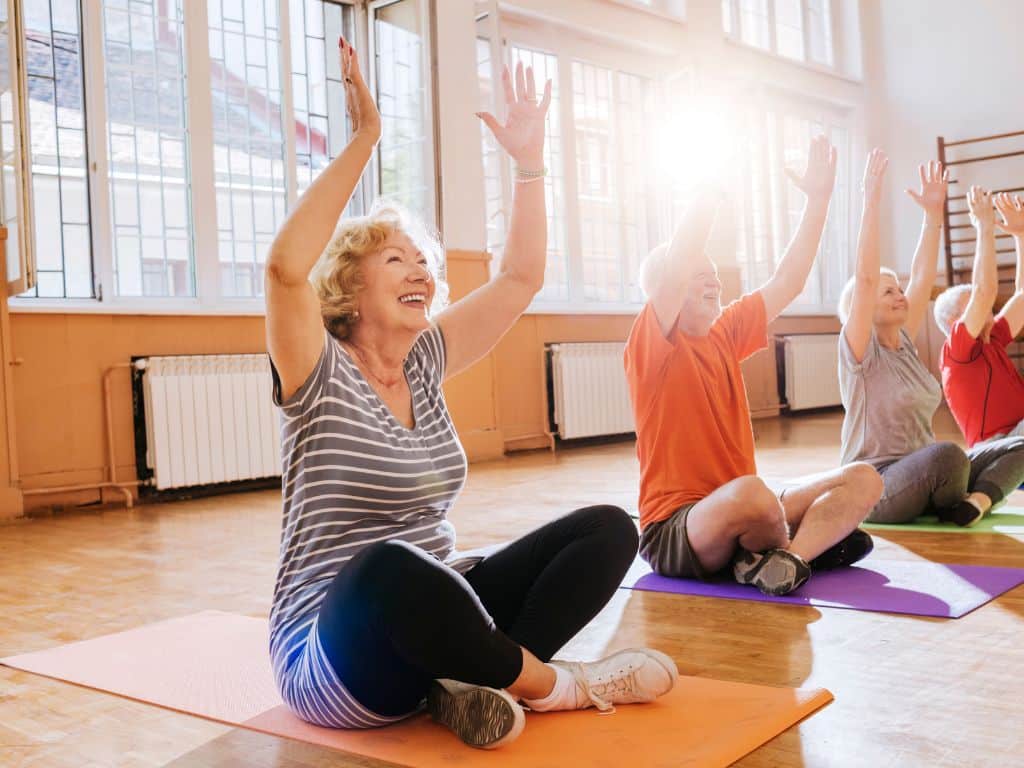
Stretching can help maintain flexibility and reduce the risk of injury. Focus on exercises that stretch the major muscle groups and can be done while seated or holding onto a chair for balance.
Simple chair exercises are a great way for seniors to stay active. These exercises often involve lifting or extending arms and legs while remaining seated, providing a low-impact workout that is safe and effective.
Preventing Slips and Falls
Falls can be particularly dangerous in the winter, when icy sidewalks and driveways create treacherous conditions. Preventing falls is a key part of cold weather safety for seniors.
Keep outdoor pathways free of snow and ice. Use a shovel or snow blower to clear large amounts of snow and sprinkle salt or sand for traction on icy surfaces.
Good footwear is essential for navigating icy walkways. Choose boots with good grip and consider traction cleats that can be worn over shoes for added stability.
Eating Well and Staying Hydrated
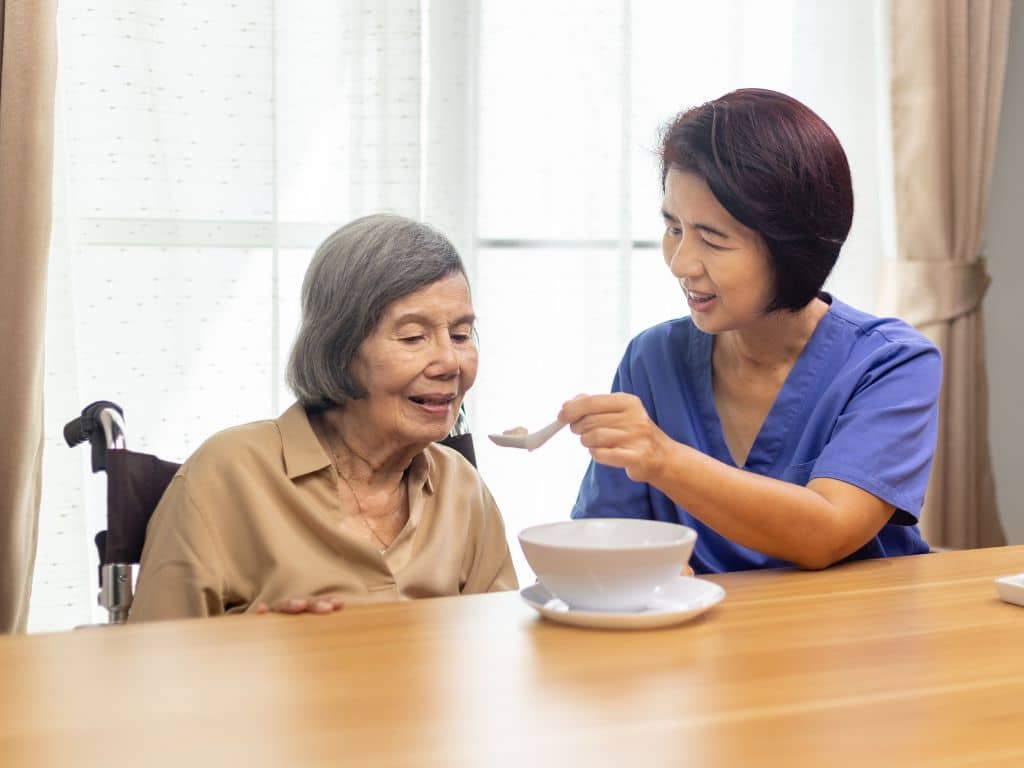
A balanced diet and proper hydration are important year-round, but especially in winter when the body needs more energy to stay warm.
Eating warm, nourishing foods can help maintain body temperature. Soups, stews, and hot drinks are not only comforting but can also provide the extra calories the body needs to fend off the cold.
Dehydration can occur in cold weather when the body loses moisture through respiration. Drink plenty of liquids, including water and warm beverages, to stay hydrated.
Warm Baths for Comfort
During the cold winter months, a warm bath isn’t just a luxury; it’s a source of much-needed comfort, particularly for seniors. But for those with mobility limitations, the simple act of stepping into a bathtub can pose a significant hazard.
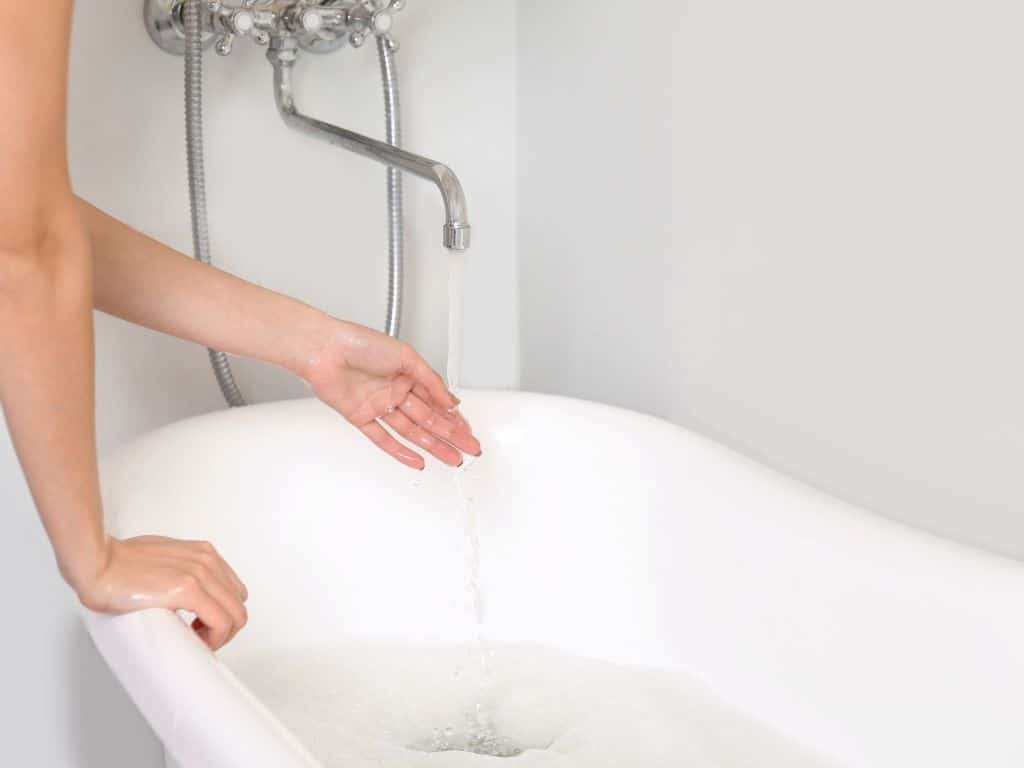
Enter the innovative design of Shower Bay, which offers a safer alternative that doesn’t require dangerous transfers or costly home renovations. With its effortless ramp access, a warm, soothing shower can be enjoyed in any room that has a standard faucet. Not only does this provide an immediate feeling of relaxation, but it also aids in improving circulation—key to maintaining good health, especially in colder weather.
The gentle warmth of a Shower Bay shower can alleviate muscle stiffness and joint pain, offering welcome relief and contributing to a senior’s sense of independence and well-being.
Social Engagement
The winter months can be isolating, especially for seniors. Social engagement is crucial for mental and emotional well-being.

Maintaining social connections can help combat feelings of loneliness and depression. Encourage interactions with friends and family, either in person or through virtual means.
Engaging in activities that bring joy and fulfillment, such as hobbies, reading, or cultural events, can help lift the spirits and provide a sense of community and purpose.
Emergency Preparedness
Being prepared for emergencies is important for everyone, and seniors should have specific plans and supplies in place.
An emergency kit should include essentials like water, non-perishable food, medications, and a flashlight with extra batteries. Consider any special needs the senior may have, such as hearing aids, walking aids, or extra layers of warm clothing.
It’s important for seniors and their caregivers to recognize signs of distress, such as uncontrollable shivering, slurred speech, or confusion, and know when to seek medical help. Don’t hesitate to call 911 if there is any concern about a senior’s health or safety.
Conclusion
Cold weather can be risky for seniors, but with the right preparation and precautions, winter can be enjoyed safely. By understanding the risks, recognizing warning signs, and taking proactive measures, seniors can navigate the winter months with ease. Caregivers play a crucial role in ensuring the safety and well-being of their loved ones, and this guide provides a toolkit for making that happen. Take the steps outlined here, and embrace the chilly weather with confidence and warmth. Also, don’t forget to check out Shower Bay for a safe and enjoyable showering experience that can bring added comfort and health benefits to seniors during the winter season.




